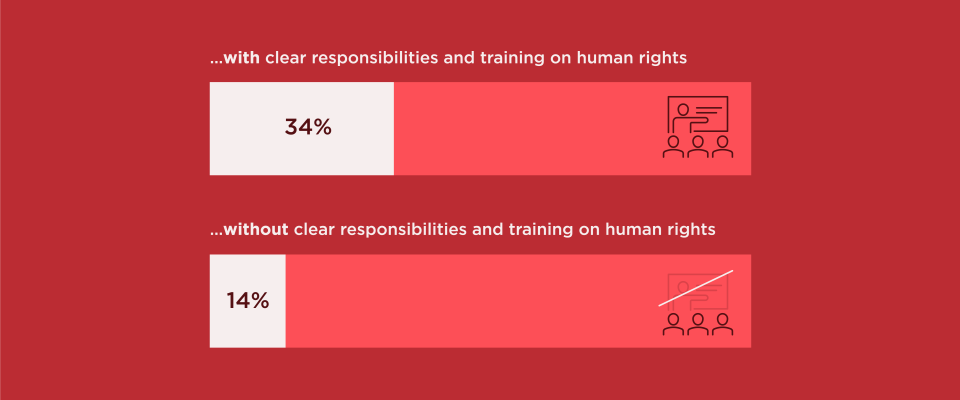Key finding
Clear responsibility and capacity building is key for translating commitments into action

This year, more than three quarters (77%) of companies assessed disclose a clear commitment to respect human rights. However, just making pledges isn’t enough: these commitments need to be put into action. While companies are at varying stages of this process, when we look at the top-performing companies, we see that two things are crucial for turning promises into real changes. Firstly, it’s key for companies to have a clear plan for who’s responsible for making sure these commitments become part of everyday practices. This includes specifying how different departments should contribute to implementing the company’s human rights commitments. Secondly, it’s important to build internal capacity on human rights, by providing employees with human rights training that is specific to their role. These practices can act as key levers for progress: companies that allocate clear responsibility for the implementation of human rights commitments and provide targeted training score 150% better across the benchmark on average.
Translating policy commitments into tangible action can be a complex and resource-intensive process that often requires the involvement of different departments within a company. It is therefore key that companies not only allocate senior-level responsibilities for human rights, but that it is clarified how different departments need to implement human rights into their day-to-day practices. Through this process, the responsibility is distributed to the parts of the business whose daily activities involve decisions that affect human rights, such as the procurement department. Company decisions that involve human rights have the potential to directly affect the human rights of many throughout a company’s operations and supply chain. They often present difficult dilemmas, requiring internal capacity and knowledge to ensure that these decisions, and their outcomes, are in line with the company’s commitments to human rights. It is therefore crucial that employees faced with such dilemmas receive adequate training, specific to their role, on human rights. However the benchmark finds that only 50% of companies disclose how they assign day-to-day responsibility for human rights across different departments, and 39% disclose providing targeted training to relevant managers and workers.
Only about a quarter of companies (27%) demonstrate their commitment to turning their promises into action by both allocating both clear day-to-day responsibility and providing training. The top-performing companies show us that these practices are essential: all top ten companies implement both these practices, whereas only 27% of the other 100 companies follow suit. As companies continue to work on respecting human rights, and as stakeholders like investors and consumers hold them accountable, these practices can act as powerful tools to make sure companies have the knowledge and resources they need to make a real difference.
